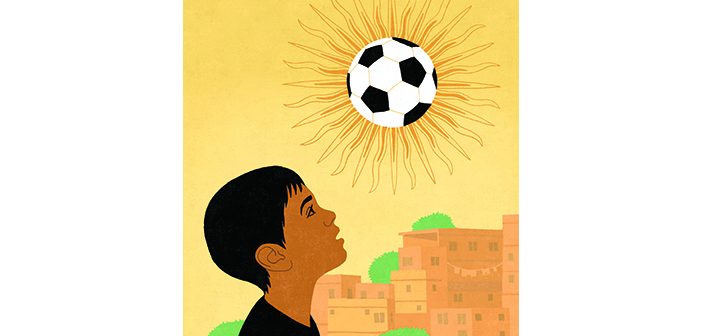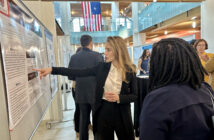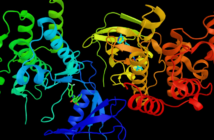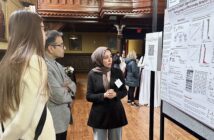Soccer is a sociocultural vaccine in Brazil.
I arrived in Rio de Janeiro early one morning in June 2016 to the sound of angry police officers on strike, holding a sign that read in English, “Welcome to Hell.” Less than a month before I arrived, a human hand had washed up on the shore of Copacabana, just blocks from where I would be staying.
I had seen that infamous sign and heard these gruesome stories on CNN at home in Massachusetts a week before. More than once I considered canceling my plans to spend a month in Rio to study an NGO’s sports-for-development program based in a favela, the summer before starting medical school at Brown.
Really what had been bothering people in Rio was the Olympics. It was to start that July and the citizens of the city were ambivalent at best—like they are about most decisions made by their politicians. On the sand, in the restaurants, and in taxis was a general confusion: why are we spending money on this, the Olympics, when those millions of dollars could be put to better use?
Like health care, so the northern half of the country could not only eradicate the threat of Zika, but have a health care network robust enough to care for the pregnant mothers and children plagued by it. Or infrastructure, to keep superbacteria out of revenue-generating beaches. Or education and jobs, to ameliorate the gap between the richest of the city and the poorest—Rio’s infamous wealth inequality.
In that political limbo, lives are forgotten. The greatest disgrace is that some are forgotten more than others, and they are forgotten more consistently. Or, put another way, there are some who are forgotten more systematically than others.
For many, the real question was, why aren’t we putting this money toward the favelas?
Favelas were being displaced to make way for new hotels to accommodate world-traveling sports fans. The discord that erupted was an acute exacerbation of a chronic division between the wealthy elite and the urban poor, one with a history of a refusal to recognize communities of people as citizens, of denial of adequate health care and education, and of violent eradications of residents—a history at odds with the country’s motto: Ordem e Progresso.
Despite the ambivalence, most still seemed to look forward to watching the Olympic soccer team led by Neymar, who would go on to score the goal that would bring a glimmer of gold at such a tumultuous time for his country. It’s hard to overstate the cultural impact of this beautiful game. It is evident from the coffee-scented streets of Ipanema in comfortable cafes with Wi-Fi, to snack shops of the sloping, colorful hills of the favelas: nothing bridges that gap between wealth and poverty quite like the bounce of a ball at the feet.
CITY OF GOD
I was there to witness what I like to think of as a sociocultural vaccine—an intervention or project that can instill change in a community by inoculating a vulnerable population with something against the sociopolitical injustices that engender poverty, those that are inherited through generations who have been cast away from surrounding communities with far more resources. In this case the patient population receiving the vaccine was a group of 60 to 80 children, ages 6 to 18, living in a favela in the shadow of Cristo Redentor.
The vaccine? Soccer, of course.
It was administered twice a week in two different settings: one a classroom in the form of sessions addressing sexual health, gender stereotypes, and violence; the other in the form of organized soccer scrimmages led by a coach named Leonardo. Leonardo had grown up in the very same favela at a time of even greater unrest, but was able to leave and pursue a degree in physical education and return to help.
At around 3 p.m. on Fridays, groups of children would arrive at the quadra, a fenced-in soccer court of cement with goals at either side.
“This kid right here is the biggest frangueiro in the favela,” my guide Marcão, another coach, joked within earshot of the goalie as we arrived. In Portuguese frangueiro is a goalie w ho often allows easy goals, a frango a goal that should’ve been saved. (Frango also means chicken—I never understood the connection.)
Marcão explained what Promundo, our NGO, was up against. Although the favela was “not as bad as it used to be,” the children often came from fractured homes and schools where teachers would sometimes not show up. And in this disorder, they would sometimes look to the dangerous world of drug trafficking for a sense of community.
But Promundo gave them an alternative; they come for the soccer and stay to learn that they have a community to return to, twice a week. If Rio’s solution to solving crime was to quarantine favela residents, Promundo’s is to build change within those confines.
GAGOS PALAVRAS
In the three weeks of my visits, the children came to welcome me, happy to see me each time. They made an effort to include me, and even gave me a nickname, gagos palavras, which was a jab at my Portuguese, translating to “eating words.” But soccer brought us closer; I grew to know these kids in between the victories and defeats.
They were polite and inquisitive, wondering why I had a different accent, what America was like, which players and teams I supported. If these were the children the world was afraid of, I didn’t see why. “Here the reaction [instead of violence]is to talk face to face. … I was always picking fights with everyone. I’ve changed a lot,” one of them told me. Promundo reports that 90 percent of the children enrolled in their program no longer use violence with their peers. And when violence and lives of crime are no longer options, real change can happen: two of the older children chose to follow in Leonardo’s footsteps and apply to college for physical education.
On my last visit, the day ended with the youngest kids taking their turn on the quadra. Boys and girls split into two teams as some of the older children stayed on the sidelines to watch.
Six-year-old Bruno stood at least a head shorter than any of the other 6-year-olds, but he had the most fans on the sidelines. He was a small boy but he spoke loudly, almost aggressively, with a would-be intimidating facial expression to match. But he was anything but. My impression was that he felt like he had to act tough because he was so small—which made him an instant fan favorite.
When he got the ball, Marcão yelled “Vai Bruno!” while the older spectators joined in. Bruno got the ball in front of the goal and scored. We all went wild, and Bruno cracked a modest smile.
But then he scored again.
To the glee of everyone watching, he ran to the other side of the court and slid onto his knees like Neymar in the Olympics. By the time he completed the hat trick, his face had changed completely: he was grinning from ear to ear to the chants of his name—his little moment of glory.
For me, that moment was emblematic of the work that this NGO and others like it do: empower children, with a crowd of people who care behind them.
Children, in a sense, become transpositions of themselves as they grow older—who they are given not just genetics, but the sociocultural ecosystem in which they grow. Soccer became a constant to these children in the disorder they have been left in. It became a ritual which, with supervision, they could latch onto as they grow into who they might become.
Constants, in a young life, bring Order. Order itself implies that there is someone who cares enough to put it there—somebody who cares about the right things like this NGO and organizations that prioritize the needs of the communities in which they serve.
And with a bit more Order, the chance of Progress.
If you are interested in supporting Bryan’s goal of starting a soccer-for-development program for recently resettled refugee youth in Providence, contact him at Bryan_Rego@brown.edu.




